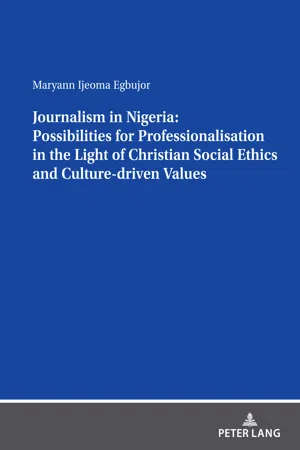
Journalism in Nigeria: Possibilities for Professionalisation in the Light of Christian Social Ethics and Culture-driven Values
- English
- PDF
- Available on iOS & Android
Journalism in Nigeria: Possibilities for Professionalisation in the Light of Christian Social Ethics and Culture-driven Values
About this book
Professionalisation of Journalism has been a subject under global scrutiny since the nineteenth century. Contemporary studies show how journalism profession grapples with the implementation of standard journalism education and practices across the globe. The author discovered that the development of journalism has remarkable link with the advent of Christianity, however, an apparent decline of ethical values in higher education and professional practices abound thereby revealing the type of quality of education provided and the substandard nature of journalistic Professionalisation. Empirical research conducted in this regard geared towards assessing the socio-ethical relevance of Professionalisation as beneficial to democratic development, and the challenges journalists encounter that hinder the implementation of professional ethics and cultural values as a contribution to human dignity, rights, justice, solidarity and the common good. To critically examine these phenomena, this research study is anchored of scientific materials. It adopted the "see-judge-act" (A Theological methodology approach used in appraising socio-ethical situations) as well as qualitative and quantitative methods. The researcher conducted thirteen semi-standardised interviews as well as analysed 200 data samples (twenty-three questions) with Mayring model and (SPSS) was used to evaluate the quantitative data. The research results showed the thirteen different interview partners unanimously consented that "journalism in Nigeria must be professionalised" and "there is need to integrate Christian social ethics and culture driven values into the training curriculum" if journalists are to regain their credibility and integrity. The tested hypotheses showed statistical significance (p<0, 05) among several others tested. Data interpreted illustrate huge consensus from the samples that 46, 5% (agree) 29% strongly agree while, 11, 5% (disagree), 2, 5% (strongly disagree) and 10, 5% responded with neutrality to the above statements. Founded on this, the author proposes integrating Christian social ethics and culture driven values in journalism to reinforce its social responsibilities, to serve as guidelines for the practical handling of low Professionalisation in Nigeria and across the globe
Frequently asked questions
- Essential is ideal for learners and professionals who enjoy exploring a wide range of subjects. Access the Essential Library with 800,000+ trusted titles and best-sellers across business, personal growth, and the humanities. Includes unlimited reading time and Standard Read Aloud voice.
- Complete: Perfect for advanced learners and researchers needing full, unrestricted access. Unlock 1.4M+ books across hundreds of subjects, including academic and specialized titles. The Complete Plan also includes advanced features like Premium Read Aloud and Research Assistant.
Please note we cannot support devices running on iOS 13 and Android 7 or earlier. Learn more about using the app.
Information
Table of contents
- Cover
- Copyright Information
- Dedication
- Acknowledgements
- Abstract
- Table of Contents
- List of Acronyms
- List of Diagrams
- Surveys
- Co-dependency Diagram
- 1. Introduction
- 2. Historical Development of CSE
- 3. An Overview of the Nigerian Context
- 4. Theoretical Discussions and Clarifications
- 5. Integrating the Principles of CSE in Professionalizing Journalism in Nigeria
- 6. Professional Code of Ethics for Journalists and the Contextual Reality
- 7. The Conflicting Tenets of African CV and Journalism Practice
- 8. Study Design and Methodology
- 9. Empirical Research Results
- 10. Conclusion
- Bibliography
- A. Questionnaire of Dissertation
- Appendixes